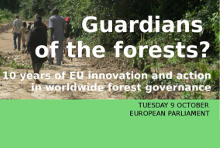As the Forest Law Enforcement, Governance and Trade (FLEGT) voluntary partnership agreements (VPA) enter the critical phase of implementation, Members of European Parliament (MEP) have stressed the need to involve and strengthen civil societies in partner countries, to ensure that VPA deliver long-lasting results.
The FLEGT Voluntary Partnership Agreements have been concluded between the European Union (EU) and six partner countries, while negotiations with seven other partner countries continue.
Given the upcoming momentum, with the entry into application of the EU Timber regulation in March 2013 and interest of new countries for a VPA, Members of European Parliament Fiona Hall (Group of the Alliance of Liberals and Democrats of Europe), Yannick Jadot (Group of the Green) and the environmental NGO Fern hosted a high-level conference entitled “Guardians of the Forests?” at the European Parliament in October, where they expressed their support to the VPA processes and the need to strengthen civil society in partner countries, in order to make the VPAs effective.
The European Parliament has a “key role to play” said MEP Yannick Jadot who, in order to support the implementation of the VPAs, developed the idea of a “joint Parliamentarian Committee” between Members of Parliament from the Partner countries and Members of the European Parliament, along the lines of the existing EU-ACP Parliamentary Assembly.
Jadot also asked the European Commission to report every six months to the European Parliament on negotiation advancements and the implementation of the negotiated agreements.
Addressing the conference, MEP Fiona Hall stressed that “it is excellent that independent reports on implementation are being done (because) implementation is always the weak area.”
Ms Hall added that the verification mechanism set in the VPA will allow companies that are importing timber within the EU to make sure that they are importing “legal timber”.
Strengthening civil society and calling for more accountability are essential elements of the VPA, she said, to ensure that there is “not a continuation in some dark corners of the previous corrupt practices”.
In order to strengthen the implementation stage, the European Commission and its Member States have dedicated substantial funding, with grants for local NGOs of partner countries to involve communities and indigenous people, to monitor forest practices and do more advocacy.
“Support is also being provided to private sector operators to develop management plans, and financing agreements with partner countries governments to support the development of the legality assurance systems, independent audits, and capacity building of the administrations to enforce the law,” said Mathieu Bousquet, Policy Officer for FLEGT at the European Commission.
Mr Bousquet has been negotiating FLEGT VPAs for the past five years. According to him, VPAs bring positive change in the practices of business operators, administrations and of civil society, and also changes in the way the different stakeholders interact together - with more respect and understanding of each other's viewpoints. Some issues, such as corruption or lack of enforcement, are brought to the table for the first time. “Identifying measures to address these issues is part of the negotiation, and this requires input from all stakeholders. Strong participation of civil society in negotiation and implementation of the VPA will be a condition for its success,” he said.
In Liberia, where illegal timber exports - along with diamonds - have fed a long and deadly war (1989-2003) and have therefore been subject to a United Nations (UN) sanction, lifted only in 2006 after a forest reform kicked off, VPA is seen as a positive way forward.
The Liberian civil society has created a platform that is engaged in the forest sector reform and is now regarded as a legitimate interlocutor by all stakeholders, said Nora Bowier, Liberia’s coordinator of FLEGT and representative of the Sustainable Development Institute.
“The government took us more as enemies, but the VPAs have brought us together”, she said.
Similar agreements may in the future be applied to other areas, according to several participants at the panel conference.
“In recent years, trade regulations have been all about free market and cutting down barriers, but in this case, trade has been used as a lever for reforms, for better governance and for improving the lives of forest communities (...) I hope it will be a model for other areas of trade regulations too”, said Environment journalist Fred Pearce, who took part to the panel and presented the findings of his comprehensive investigation on FLEGT in forest countries.
You can watch the main addresses, including from Commissioner Andris Piebalgs, in the video coverage of the event on this page in the capacity4dev.eu FLEGT group.
Further video interviews with seminar participants took place at the seminar. Please watch these on this page.
This collaborative piece was drafted with input from Mathieu Bousquet and Valerie Cuvelier, with support from the capacity4dev.eu Coordination Team.


Log in with your EU Login account to post or comment on the platform.